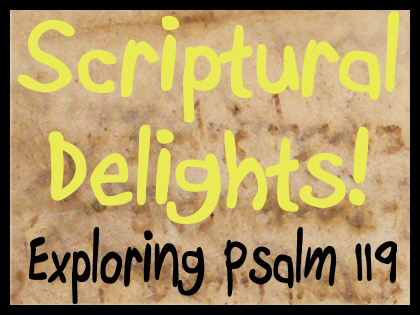
432.4K
Downloads
3364
Episodes
G’day and welcome to Partakers Christian Podcasts! Join us for uplifting Bible teaching, inspiring readings, heartfelt worship, powerful prayers, and fascinating church history. Whether you’re new to faith or growing deeper in your journey, we’re here to encourage and equip you. 🎧 Tune in, interact, and be inspired—wherever you are in the world.
G’day and welcome to Partakers Christian Podcasts! Join us for uplifting Bible teaching, inspiring readings, heartfelt worship, powerful prayers, and fascinating church history. Whether you’re new to faith or growing deeper in your journey, we’re here to encourage and equip you. 🎧 Tune in, interact, and be inspired—wherever you are in the world.
Episodes

Thursday Feb 20, 2025
Scriptural Delight 20 - Psalm 119:137-144
Thursday Feb 20, 2025
Thursday Feb 20, 2025
Tsadhe
137 Righteous are you, O LORD, and your laws are right. 138 The statutes you have laid down are righteous; they are fully trustworthy. 139 My zeal wears me out, for my enemies ignore your words. 140 Your promises have been thoroughly tested, and your servant loves them. 141 Though I am lowly and despised, I do not forget your precepts. 142 Your righteousness is everlasting and your law is true. 143 Trouble and distress have come upon me, but your commands are my delight. 144 Your statutes are forever right; give me understanding that I may live.
The very first word in the NIV translation introduces the dominant theme in this stanza. It's about God and things being ‘right' or ‘righteous'. Cast your eyes over verses 137, 138, 142 and 144. Then, looking at them more closely, we get to see something like this. v137. God is righteous. ‘Righteous are you, O Lord. This may be understood in terms of God's relationship with his people. He keeps his promises. He provides for their needs. He is faithful in all his deeds and ways. He always does what is right, for God cannot deny himself; God cannot lie; God cannot break his word, once given. Verse 140 reads, ‘Your promises have been thoroughly tested, and your servant loves them.' God is righteous. He's consistent. If that is true, then what flows from God is also righteous.
Verse 137 again, ‘You are righteous, O Lord, and your laws are right.' God gave his Law through Moses. The detailed laws within it were designed to shape the crowd of people who escaped from slavery in Egypt, into a coherent nation fit to live in the Promised Land, where they would show the rest of the world what the LORD was really like. At least, that was the intention, but its working out fell short of God's wishes, because his people were not altogether co-operative.
Verse 138 has a similarly high view of God's statutes - another word describing the detail of God's Law. ‘The statutes you have laid down are righteous; they are fully trustworthy.' They flow from God, therefore they are as dependable and effective as God himself is. If God said it, then you can rely on it.
Verse 144 suggests the permanence of what God has said. ‘Your statutes are for ever right; give me understanding that I may live.' Most of what has occupied his thought in this Psalm was written well before he was born, some of it many centuries before, yet he sees it as still relevant to him, because it flows from the righteous God. In an earlier stanza, verses 89-90, he has already written, ‘Your word, O Lord, is eternal; it stands firm in the heavens. Your faithfulness continues through all generations.'
The Lord isn't fickle or capricious, saying one thing now and a totally different thing a little later. You can build your life on God's word, just as Jesus spoke of the wise and foolish builders in Matthew 7. Wise people always build on the truth that the Lord Jesus brought to us. And he, as Hebrews 13:8 tells us, ‘is the same yesterday and today and for ever.' And, finally, in verse 142, he comes back to the Lord himself, commenting, ‘Your righteousness is everlasting and your law is true.' It all starts with the Lord, filters down through his Law - his word for his People - which, in turn shapes them to demonstrate what kind of a God he is.
Let's remind ourselves once more, of 2 Timothy 3:16-17, ‘All Scripture is God-breathed and is useful for teaching, rebuking, correcting and training in righteousness, so that the man (or woman) of God may be thoroughly equipped for every good work.' So, that is the thrust of this passage for those of us who have committed our lives to Christ and are listed among his people. We have the word of God to a much greater extent than the psalmist did, in that we have both Old and New Testaments. If we don't have an appetite to read and hear it, ask the Holy Spirit to make us hungry for it.
If our lives are being shaped mostly by influences drawn from this world in which we live, let's open ourselves up to the Lord through Scripture, and ask the Holy Spirit to use it to make us more like the Lord himself, to whom we owe everything spiritually. If our reading of life's negative experiences causes us to doubt the goodness and love of God, let's soak our minds in the glorious truth of a passage like Romans chapter 8. If we have doubts about our salvation let's give ourselves, this Easter, to reading in the Gospels the four accounts of Jesus death and resurrection. And so the list could go on, but it's time to close. I leave you with one of Scripture's famous 3:16s - Colossians 3:16, ‘Let the word of Christ dwell in you richly.' The Lord be with you.


No comments yet. Be the first to say something!